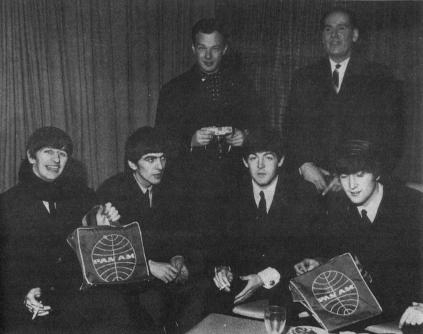He Made The Beatles Millionaires
And They Called Him 'Mister Epstein'
By Sandy Gardiner, The Ottawa Journal
The starmaker is gone.
Brian Epstein, 32, died on Sunday, leaving behind a legacy
of long hair and $18,000,000.
Not since Col. Tom Parker has any manager held so much
power in the pop industry. He was the guiding light in bringing British artists,
primarily The Beatles to world-wide chart dominance.
It all began on the back streets of Liverpool. It ended in
plush Bulgaria, an exclusive suburb of London where the multi-millionaire had
set up home.
Epstein was a shy, quiet, lonely man. But in the pop
business none could better him.
Before long hair became a sign of musical times, Epstein
tramped around London trying to peddle The Beatles to a record company.
*
*
*
HE TRIED all the majors with little success.
When he played a demo record of the group to Decca Records and was turned down,
he told them "One day this group will be bigger than Elvis Presley." They
laughed.
On his 13th try, a friend arranged a meeting
with record producer George Martin. Martin listened to the disc and agreed to
see the group.
In London two years ago, George told me: "I
saw them at the Cavern. They weren't great. But they had a magnetic quality. We
talked and I decided to make their first record."
Later, when they came to London to make a
demo of their initial single, the producer didn't like the drummer, Pete Best.
He told Brian that Best just couldn't be used on the session.
At the same time The Beatles were unhappy
with Pete. They felt he wasn't pulling his weight.
*
*
*
SO BRIAN went on a talent hunt. And, at a
holiday camp he found Ringo Starkey, later to become just plain Ringo Starr.
Ringo came to Liverpool and worked with the
group, rehearsing the first disc. Then it was back to London for the recording
session.
But George didn't want to take a chance. He
brought in a session drummer and allowed Ringo to play tambourine on "Love Me
Do."
|

|
|
Later he listened to Ringo and told Brian he
couldn't have made a better choice.
When Beatlemania erupted in the U.S. and
groups embarked on its first tour, Brian travelled with them. And the quartet
made use of all his advice. They listened, discussed and decided.
At every press conference he stood quietly in
the background, often unnoticed by reporters. And in public The Beatles always
showed their respect for their boss.
When he was present, they always referred to
him as "Mr. Epstein." Not once did they call him Brian.
*
*
* |
IN BUSINESS, he was tough and at times,
ruthless. He expanded his empire with other acts, Billy J. Kramer, Gerry and The
Pacemakers, The Fourmost, The Silkie, The Moody Blues, Paddy, Klaus and Gibson.
He took over a London theatre, The Saville,
and started bringing in top name American rock acts coupling them with his own
discoveries for exposure.
Once he wanted to sign an American
group called The Walker Brothers. They had just arrived in London and were
planning to settle there.
As a group they had tremendous talent,
Epstein recognized it and had made them an offer but the percentage he wanted
made his Beatles percentages seem small fry.
Needless to say, they didn't join the fold
and went ahead to make it big in Britain without the mastermind.
*
*
*
IN THE last year, the NEMS (that's the
Epstein company name) development steamed ahead. He and The Beatles bought
shares in a movie company, opened up an American office, Nemperor, and brought
more acts into his fold through advantageous mergers.
The Who and Donovan indirectly came under his
wing while he worked on an Australian group called The Bee Gees and an American
act The Cyrkle. Both achieved chart stardom.
His last project before his death was a group
called The Lomax Alliance. This was to be a completely British, American
combination, equally balanced in nationalities.
Who knows now whether the group will come to
pass. The Epstein magic is no longer around. Only the unequalled achievements of
his protégés will keep his memory alive.
- End of article. Copyright by The Ottawa
Journal. Article used with permission by the author. Sandy Gardner's report on
Brian Epstein was published on Friday, September 1, 1967, page 14 of The Ottawa
Journal.


